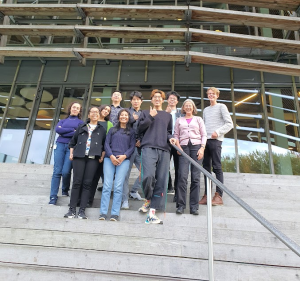Doing the Joint Water Technology MSc: Daan Metz
Out of the many master’s Programs that Wageningen University offers, there is one that seems somewhat more daunting than the rest: the joint Water Technology degree. The degree is a joint effort of Wageningen University, the University of Twente and the University of Groningen and the program is carried out in the Wetsus research facility at Leeuwarden. If you have been looking into doing this program and have been wondering about the difference between a joint degree and other regular master’s courses, you’ve come to the right place! To get a glimpse of what it’s like studying for this degree, I had the opportunity to interview a student attending the program.
Meet Daan!
Daan Metz is one of the 7 students of his batch of Water Technology MSc students. He studied his HBO in Hogeschool van Hall Larenstein, which is conveniently situated right across the Wetsus institute. From there, he learnt of the existence of the joint program and took an interest in it. It wasn’t long until he decided to enrol to continue his studies there. He’s responsible for providing most of the information relayed in this post.
Due to the program being quite a niche, the typical cohort would usually carry around 15-20 students and can be very personalized to the group. The 2-year course consists of 1 year of classes followed by a 2nd year dedicated to the thesis and an internship. In this aspect, it is not very different from most MSc courses here at Wageningen.
So, how is a joint master’s program different from a regular master’s program?
According to Daan, the workload seems to be different than most other master’s programmes. In comparison to others, he knew doing a master’s, he finds himself with less free time. However, this isn’t to say that he is fully deprived of his free time.
The classes are also more organized and varied. Although all the courses in the master’s are prescribed to the students, being a joint effort of 3 universities, the program is perfectly tailored with a variety of lecturers from all 3 universities. This way, you get “the best of every university in terms of their experts in the field”. Being situated in a water research facility is also an added bonus as it gives easy access to a hands-on learning experience.
Do you feel like you’re missing out on student life?
Having the program housed in a research institute, Daan doesn’t have access to the typical Dutch university experience, namely association activities. However, being located in Leeuwarden, close enough to the University of Groningen, he still gets the benefits from the Groningen campus and has access to most of the sites. Furthermore, a lot of activities are still organized by the students and researchers from Wetsus. Thus, other than the association life, one wouldn’t miss out too much on the social life from doing a master’s.
What is the difference between a joint degree and a double degree?
A common misconception of a joint degree is that it is the same as a double degree. It is not. A double degree would mean that a student will take on 2 programs at the same time and graduate with 2 degrees while a joint degree means that the student will do a program that is a hybrid of two or more subjects but will graduate with a single degree. In this particular case, the joint degree also happens to be provided by 3 universities together.
How is the campus different from that of a university?
All the classes are given in the same singular classroom in the building. However, being in the research facility building means that the students also share their space with various companies that are affiliated with the research institute. Furthermore, the facility also does not come with a library but all course material can be accessed online. However, despite the absence of a dedicated library, most of the subject matter, such as books and theses, are also available in print. The building also has spaces dedicated to studying.
How do you apply for this master’s?
Applying for this master’s isn’t any different than applying for any other program. Daan also applied for a different program as a backup and the application processes were very similar. All was done via Studielink and the same kind of documents were required.
Overall, it seems that a joint degree isn’t as daunting as one would deem it to be. However, this is not to say that it wouldn’t be a challenge. You’d be expected to put in more work, yes. But following one may just put you at an advantage with the amount of knowledge you gain without having to invest as much time as you would following a dual degree, it might just be worth it.
For this specific master’s program, you can find more information by clicking the following link: Master’s Water Technology (joint degree) – WUR.


